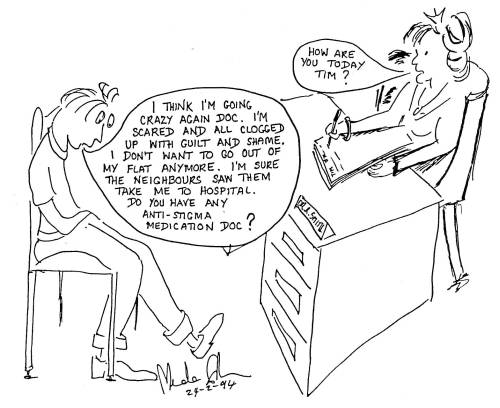Doctor Nolan said, quite bluntly, that a lot of people would treat me gingerly, or even avoid me, like a leper with a warning bell. My mother's face floated to mind, a pale reproachful moon, at her last and first visit to the asylum since my twentieth birthday. A daughter in an asylum! I had done that to her.Esther Greenwood's exposure to the mental health care system was very negative, as it is for many other people in the 20th and 21st centuries. In all that time though, why has there been such little improvement in stigma against the mentally ill? I have already shown that he Stigma against people with severe mental illness (SMI) can cause great damage. Not only can it cause more anxiety in patients, but it can limit their career and social opportunities Stigma starts with health professionals, who more often than not do nothing about the problem. The reasons for this are varied. Some professionals say they are too busy, while others think that one individual cannot change stigmatization. Many think that the stigma attached to mental illness is a part of the greater stigma against other illness, and is therefor too great of a problem to fix.
Many psychologists and health professionals have put together programs though to help alleviate stigma in hospitals, and in the real world. One of the chief advocates of programs with this common goal was former first lady Rosalynn Carter. The Carter center has put together several initiatives to improve the American mental health care system. First of those that I encountered is the Primary Care initiative launched in 2008. The purpose of this program was to address this hidden problem in American health care, and provide earlier diagnosis and treatment for mental illness in a primary care setting.
The program argued that an overhaul of the primary care education system, including starting a more rigorous training in mental illness diagnosis and treatment, is necessary to fully implement reform of the U.S. health care system. John Bartlett, MD, MPH, senior adviser at the Carter Center's Primary Care Initiative stated that, with mental illness which affects one quarter of Americans, billions of dollars are waster because clinicians are not properly trained to recognize and treat these disorders properly and in a primary care setting.
The plan have five steps to improve mental illness treatment, and as a result lesson stigma. First is the education of health professional students about the socioeconomic, demographic, political, and cultural issues affecting mental health care. Also to encourage professional programs to introduce a psychology or sociology course as a requirement to enter the program. Second is to develop more of a person centered approach to health care, rather than a disease centered approach. This includes encouraging team work with the patient, their families, and other professionals to help the patient. Next the initiative wants there to be a shift from the specialty care setting to the primary care setting while dealing with treatment in behavioral care. Fourth is an increase in resources dealing with mental health, and more research towards cures and solutions. Lastly is to enforce the measuring of results from the initiative so that we all can see what is working to alleviate illness, and what isn't. The program still exists today and is a living example that it is not out of our reach to improve the care of mental illness, and the stigma that tails behind it.

No comments:
Post a Comment